100 Useful Arabic Phrases to Navigate Arab Countries
If you want to learn Arabic or go to an Arab country, it’s good to know some simple Arabic phrases. Not only will it improve your trip, it will also help you connect easier with Arabs. This applies to whichever country you choose to visit in the Arab world.
In this article, we’ll be learning 100 valuable Arabic expressions. These phrases will make your exploration of Arab countries and the Arabic language more exciting.
So, without further ado, let’s jump right in!
Disclaimer: Please note that the transliterations between brackets are there to help you. They don’t represent the exact pronunciation of the words.
Table of contents
12 Must-know Basic Arabic Words
You want to learn only a few essential Arabic expressions? No problem, here are 12 Arabic phrases that will serve as a foundation for your journey to learn Arabic.
- “Hello” – مرحبًا (Marhaba)
- “Good morning” – صباح الخير (Sabah al-khayr)
- “Good evening” – مساء الخير (Masa’ al-khayr)
- “Thank you very much” – شكرًا جزيلا (Shukran jazeelan)
- “You’re welcome” – على الرحب والسعة (Ala rohb wa seaa)
- “How are you?” – كيف حالك؟ (Kayfa halak/halik for males/females)
- “I’m fine, thank you” – أنا بخير، شكرًا (Ana bikhair, shukran)
- “My name is…” – …اسمي (Ismi…)
- “Excuse me” – عذرًا (Athar’an)
- “I don’t understand” – لا أفهم (La afham)
- “Where is…?” – أين…؟ (Ayna…?)
- “Goodbye” – وداعًا (Wada’an)
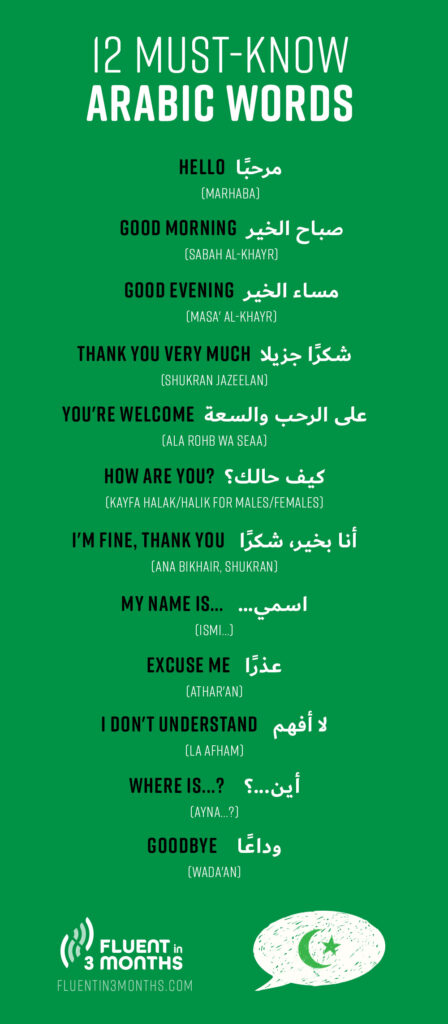
PS: In Arabic countries, when someone tells you صباح الخير (Sabah al-khayr), you reply with صباح النور (Sabah al-noor). The same is true for مساء الخير (masa’ al-khayr); you reply with مساء النور (masa’ al-noor).
Arabic Phrases: The Basics
If you’re just starting out, you’ll need a load of basic Arabic phrases to help you along.
Let’s start with greetings and basic expressions. Most of these are used regardless of whether or not the situation is formal, so feel free to use them whenever you need to.
Arabic Greetings and Basic Expressions
- “Hello” – مرحبًا (Marhaba), we also say السلام عليكم (Assalamo alaykom)
- “Good morning” – صباح الخير (Sabah al-khayr)
- “Good evening” – مساء الخير (Masa’ al-khayr)
- “Welcome” – أهلاً وسهلاً (Ahlan wa sahlan)
- “How are you?” – كيف حالك؟ (Kayfa halak/halik for males/females)
- “I’m fine, thank you” – أنا بخير، شكرًا (Ana bikhair, shukran)
- “What is your name?” – ما اسمك؟ (Ma ismak/ismik for males/females)
- “My name is…” – … اسمي (Ismi…)
- “Nice to meet you” – تشرفت بلقائك (Tasharraftu biliqa’ik)
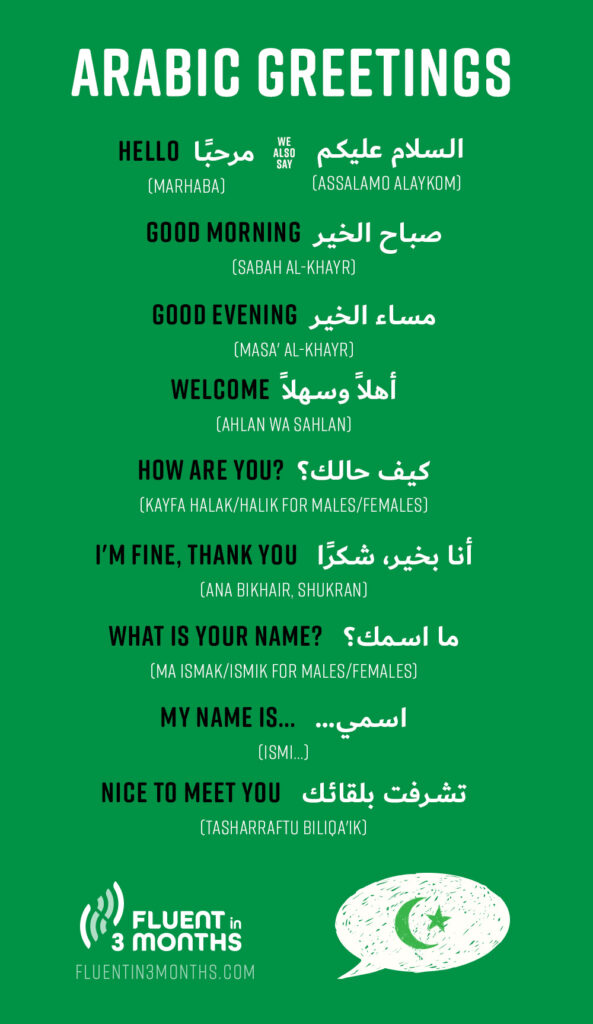
Polite Expressions in Arabic
- “Please” – من فضلك (Min fadlik/fadlik for males/females) or أرجوك (Arjouk)
- “Thank you” – شكرًا (Shukran)
- “You’re welcome” – عفوًا (Afwan)
- “Excuse me” – عذرًا (Athar’an)
- “I’m sorry” – أنا آسف/آسفة (Ana asif/asifa for males/females)
- “Yes” – نعم (Naam)
- “No” – لا (La)
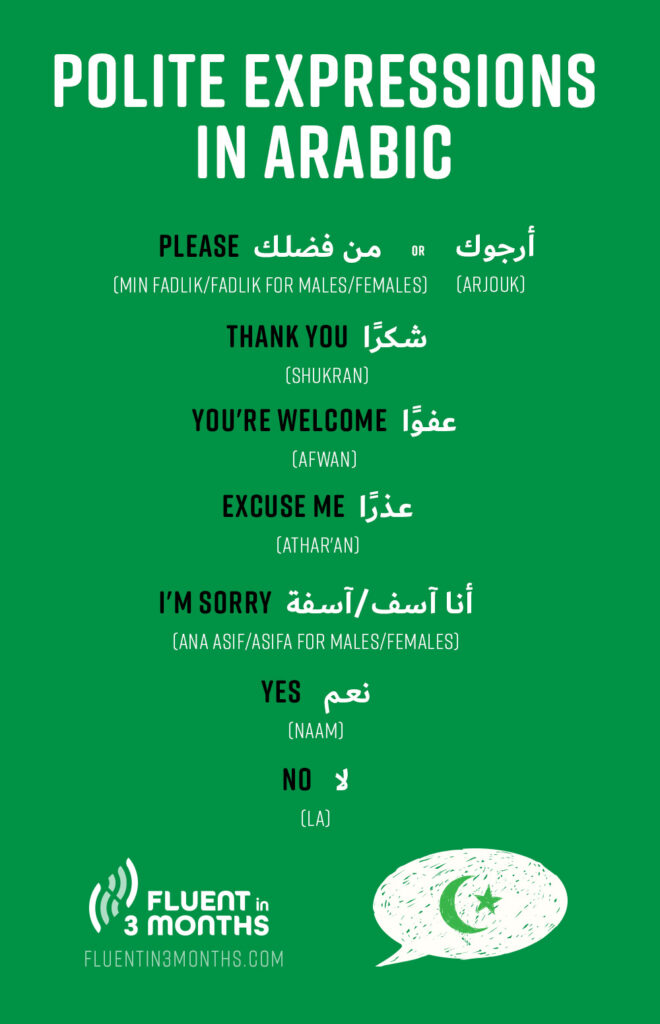
Arabic Phrases to Express Interest
Imagine you’re having a conversation with a local, and you want to show your interest. The Arabic expressions below will surely help you!
- “This is beautiful” – هذا جميل (Hatha jameel)
- “I like it” – أحبه/أحبها (Uhibbuh/Uhibbaha for males/females)
- “That’s interesting” – هذا مثير للاهتمام (Hatha muthir lil-ihtimam)
- “Tell me more” – أخبرني بالمزيد (Akberni bil-mazeed)
Saying Goodbye in Arabic
It’s always hard to say goodbye, but let’s not forget there’s always a chance for future encounters. Here are some expressions to say “goodbye” (or “see you later”) in Arabic.
- “Goodbye” – وداعًا (Wada’an)
- “See you later” – أراك لاحقًا (Arak lahiqan)
- “Until we meet again” – حتى نلتقي مجددًا (Hatta niltaqy majdan)
- “Take care” – اعتنِ بنفسك (Eiten bi-nafsik)
- “Farewell” – مع السلامة (Ma’a al-salamah)
- “Have a good day” – أتمنى لك يومًا سعيدًا (Atamannu lak yawman sa’idan)
- “Have a safe journey” – سفرًا آمنًا (Safaran aman)
- “Goodbye, my friend” – وداعًا يا صديقي (Wada’an ya sadiqi)
- “Stay in touch” – بقِ على تواصل (Buqa ala tawasul)
- “See you soon” – أراك قريبًا (Arak qareeban)
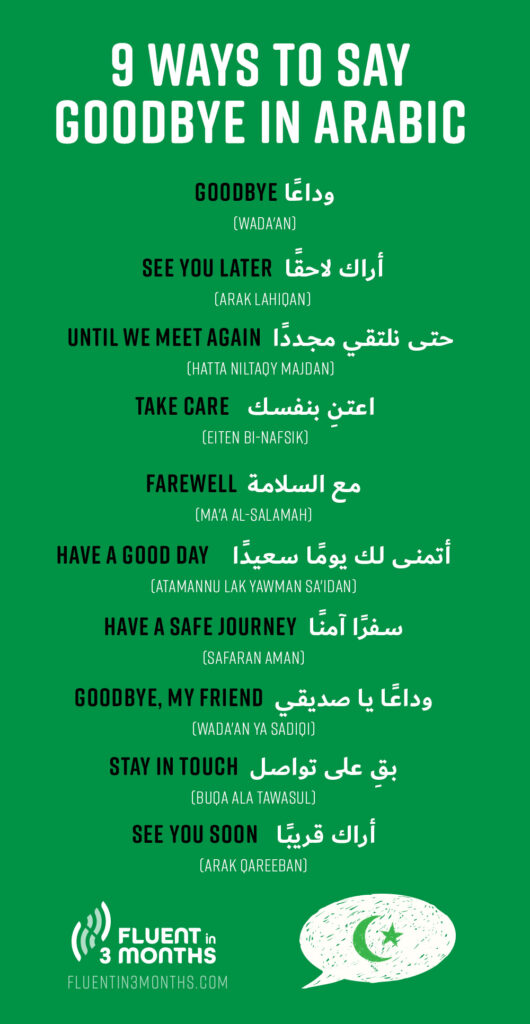
Common Arabic Phrases for Daily Life
Arabic is not only the official language of 25 countries but also a window into the rich culture of the Arab world. It is a beautiful and complex language. In short, whether you’re shopping or making new friends, using everyday Arabic phrases makes it cool. These phrases act like keys, helping you talk better.
Keep reading for a list of Arabic expressions people use every day.
Arabic Expressions for Getting Around
- “Where is…?” – أين…؟ (Ayna…?)
- “How much is this?” – بكم هذا؟ (Bikam hatha?)
- “I want…” – أريد… (Ureed…)
- “I don’t want…” – لا أريد… (La ureed…)
- “Can you help me?” – هل يمكنك مساعدتي؟ (Hal yumkinuka musa’adati?)
- “I need a taxi” – أحتاج سيارة أجرة (Ahtaju siyarat ‘ajrah)
- “Straight ahead” – مباشرةً (Mubashiran)
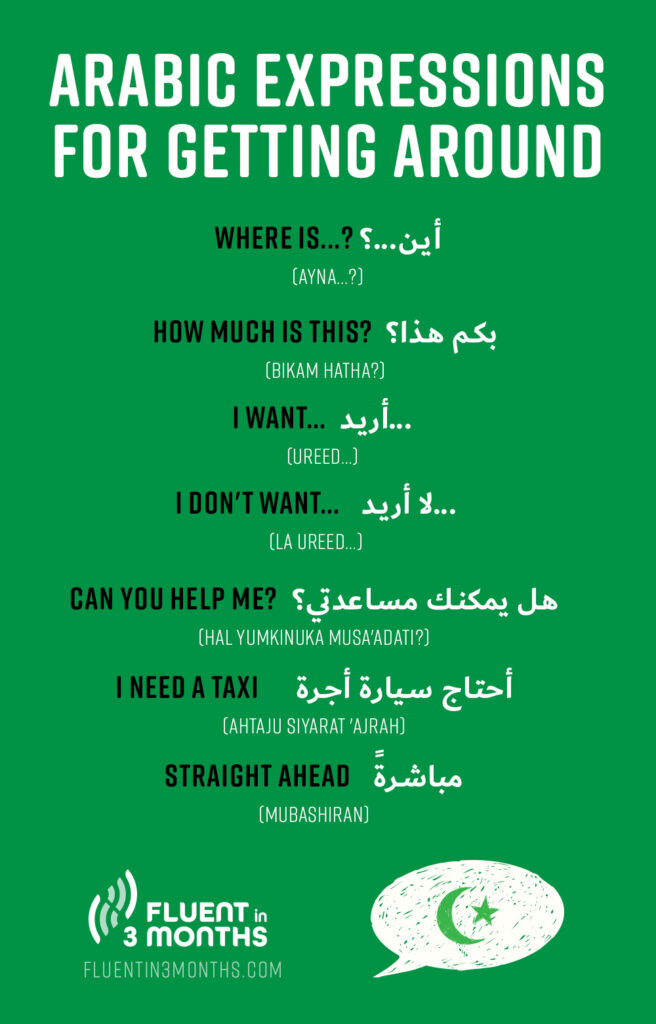
Common Arabic Phrases and Questions
- “How much does this cost?” – كم ثمن هذا؟ (Kam thaman hatha?)
- “Can I try this on?” – هل يمكنني تجربته؟ (Hal yumkinuni tajribatah?)
- “It’s too expensive” – إنها مكلفة جدًا (Innaha maklifah jiddan)
- “Do you have something cheaper?” – هل لديك شيء أرخص؟ (Hal ladayk shay’an arkhos?)
- “Can you give me a discount?” – هل يمكنك أن تعطيني خصم؟ (Hal yumkinuka an ta’teeni khasm?)
- “I’m just browsing” – أتصفح فقط (Atasaffah faqat)
- “Do you have this in a different color/size?” – هل لديكم ذلك بلون/حجم مختلف؟ (Hal ladaykum thalika bilawn/hajm mukhtalif?)
- “What time is it?” – كم الساعة؟ (Kam al-saa’ah?)
- “Can I take a photo?” – هل يمكنني التقاط صورة؟ (Hal yumkinuni al-taqattur surah?)
- “What is this place called?” – ما اسم هذا المكان؟ (Ma ismu hatha al-makan?)
- “Can you recommend a good restaurant?” – هل يمكنك أن توصي بمطعم جيد؟ (Hal yumkinuka an tawsi bi-mat’am jayyid?)
- “What’s your favorite food?” – ماهو طعامك المفضل؟ (Ma huwa ta’amuka al-mufaddal?)
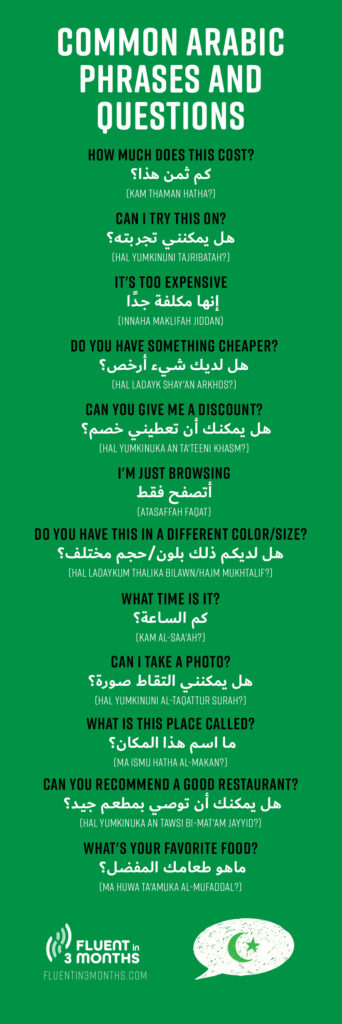
Exclamations, Celebrations and Well Wishes in Arabic
- “Congratulation” – تهانينا (Tahanina)
- “That was excellent!” – كان ذلك مميزاً (Kana dhalika momayazan)
- “Best of luck!” – حظاً موفقاً (Haddan mowaffakan)
- “All the best to you!” – كل التوفيق (Kollo tawfiq)
- “Happy birthday!” – عيد ميلاد سعيد (Aid milad said)
- “Stop!” – قف (Qif)
- “Get well soon” – أتمنى لك الشفاء العاجل (Atamana laka chifaa’ l’ajil)
- “Bon appetit” – بالهناء و الشفاء (Bilhanaa wa chifaa)
- “Take care” – اعتن بنفسك (I’tani binafsek)
- “Long time no see” – لم ارك منذ فترة طويلة (Lam araka/araki mondo fatra tawila)
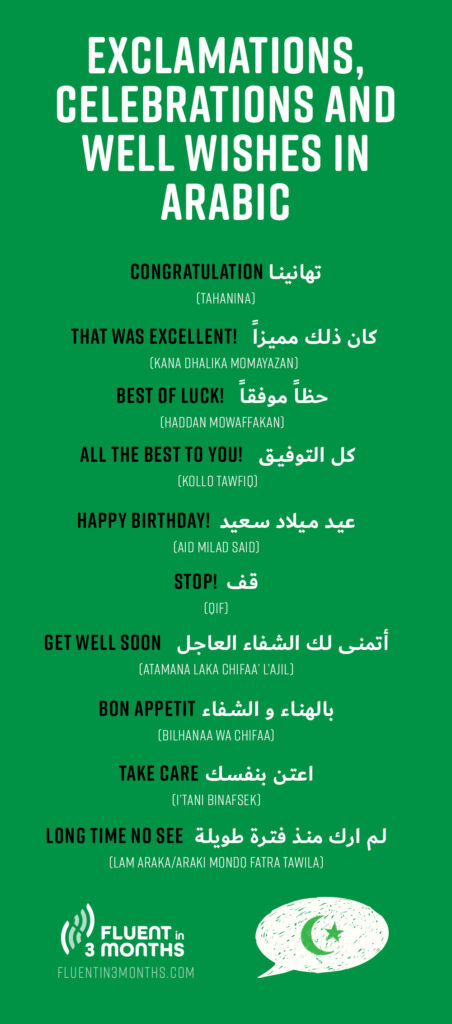
The Arabic language is known for its richness. As such, a lot of times many words and phrases have the same meaning. For example, to say “Bon Appétit,” you can say any of the following and the meaning is still the same: بالهناء و الشفاء (bilhanaa wa chifaa), or بالصحة و العافية (bissiha wa l’afiya), or شهية طيبة (chahia tayiba). Another example is saying طال غيابك (tala ghuabok) instead of لم أرك منذ فترة طويلة (lam araka/araki mondo fatra tawila) to say “long time no see.”
Arabic Filler Words and Phrases
Filler words may not sound like much but they truly help you sound more like a native. Here is a list of common Arabic filler words and phrases. Be sure to add them to your linguistic toolbox!
First, let’s see some Modern Standard Arabic filler words. These words are understood by every Arabic-speaking country. But, it’s best practice to know what’s said in the specific country you’re visiting.
- “Beautiful” – جميل (Jamil)
- “Sorry” – عفواً (Afwan). This is mainly used to ask for repetition or to respectfully interrupt someone.
Like I said, Arabic is the official language of many Arabic-speaking countries. But guess what? Each of these countries has its own dialect.
Let’s start with some Levantine Arabic filler words:
- “Means” – يعني (Ya’ni)
- “By God” – و الله (Wallah)
- “Good” – طيب (Tayyib)
- “Now” – هلأ (Halla’)
In Morocco, you can say any of these two:
- “Like” – زعما (Zaama)
- “So” – إيوا (Ewa)
Fun Fact: I say زعما (Zaama) around a hundred times per hour. How do I know? My dad took it upon himself to count them one time.
In Egypt, you’ll likely be using these a lot in their conversations:
- “Sweet” – حلو (Hilw)
- “Anyway” – أصلاً (Aslan)
Funny Arabic Phrases
Laughter knows no language limits, and Arabic has a bunch of funny sayings that will make you giggle. These phrases show how fun language can be.
Here, we’ll explore these phrases that bring smiles and show the humorous side of Arabs. So with that said, buckle up and get ready to laugh and learn more about the fun side of Arabic culture!
- روح بلط البحر/ روح كنس الصحراء (Rouh balt al-bahr/rouh kans al-sahraa).This means “go swim in the sea” or “go sweep the desert.” It’s funny because it’s asking someone to do something really hard, like swimming in the sea or sweeping a big desert.
- فولة و انقسمت نصفين (Foula wa inqasamat nisfayn). Literally translates to “a fava bean split in two”. This phrase is like “two peas in a pod” in English, which is used to say that two things are like each other.
- قتل قتيل و مشى لجنازه (Qatal qateel wa mashaa li-janaazah). This means “killed someone and went to his funeral.” This phrase has kind of the same meaning as “adding insult to injury.” For example, someone causes a big problem, then shamelessly fakes sympathy over it.
- دمه ثقيل/دمه خفيف (Damuhu thaqeel/damuhu khafif). These two are actually the opposite of each other. دمه ثقيل (Damuhu thaqeel) is used to say that someone is boring while دمه خفيف (damuhu khafif) means that the person is sweet and funny.
- تقبر قلبي/تقبرني (Taqrab qalbi/ taqburni). These phrases literally translate to “you bury my heart” or “you bury me.” They reflect intense love or sympathy for someone.
- القرد بعين أمه غزال (Al-qird bi-‘ayn ummi ghazaal). Translates to “the monkey is a gazelle in its mother’s eyes.” In English, this is like saying “beauty is in the eye of the beholder”.
- صام وأفطر على بصلة (Saam wa aftara ‘ala basalah). Translates to “he fasted and broke his fast with an onion” in English. It portrays a situation where someone works hard on something. Yet, the end results are disappointing.
- إن كان حبيبك عسل متلحسوش كله (In kaan habeebuk ‘asal matlahisoo kullah). In English: “If your beloved is honey, don’t lick it all off.” This advises moderation as it means that if someone is nice to you, don’t take advantage of their kindness.
- حل/حلي عني (Hul/hulay aannee). Translates to “dissolve yourself off me,” it means “leave me alone” or “get lost.”
- الجنازة حارة والميت كلب (Al janazah harrah wal-mayyit kalb). This is used in the context where someone overreacts or makes a big deal about something that is quite trivial. In English, this would be like saying “much ado about nothing.”
Commonly Used Moroccan Arabic Phrases and Expressions
Morocco is a country known for its diversity. The official languages of Morocco are: Darija and Tamazight. Darija is the one commonly used while Tamazight is mainly used in rural areas.
Unfortunately, there aren’t a lot of resources available for those wanting to learn its language. I’m talking especially about Darija here, but the same can be said about Tamazight. Add to that the fact that it’s mostly an oral language and it’s believed to be the hardest amongst the languages spoken in the Middle East.
I beg to differ, but that’s because I’m very biased since I’m Moroccan.
Read on to learn some common Moroccan Arabic phrases!
- “How are you?” – لباس؟ / لباس عليك؟ (Labas? or Labas elik?)
- “What is this?” – شنو هذا؟ (Shnu hada?)
- “Do you have…?” – واش عندك…؟ (Wash aandak…?)
- “Thank you very much” – بارك الله فيك (Barak Allah fik)
- “I am looking for…” – كنقلب على (Kanqallab aala…)
- “I don’t want anything” – مابغيت والو (Ma brit walou)
- “Speak slowly” – هضر بالشوية (Hdar bechwiya)
- “Do you have…?” – واش عندك؟ (Wash aadak?)
- “Come here” – أجي لهنا (Aji lehna)
And that’s a wrap for this article! Hope you like it and that it helps set you up for your Arabic learning journey. Remember to practice and have loads of fun learning this beautiful language.
Before you go, did you know that you can speed up your Arabic learning journey by listening to Arabic songs? Mind blowing, I know. If that seems like something you’d like to try, check out this post where I talk about 12 of the best songs you can use to practice your Arabic skills.
بالتوفيق والنجاح إن شاء الله!

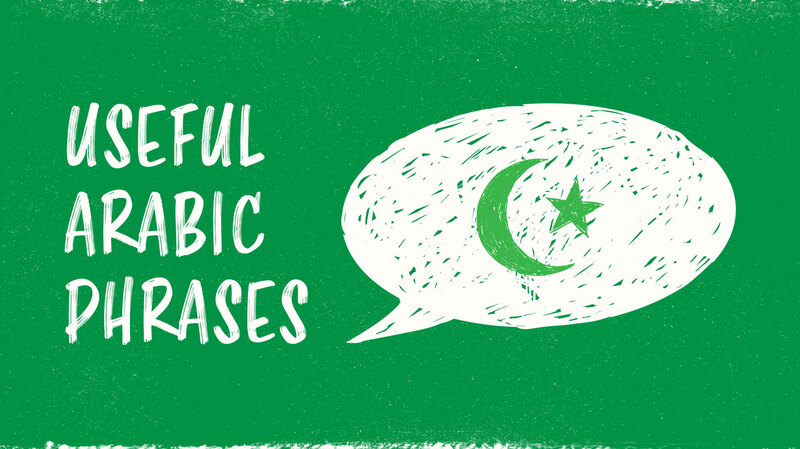

Social